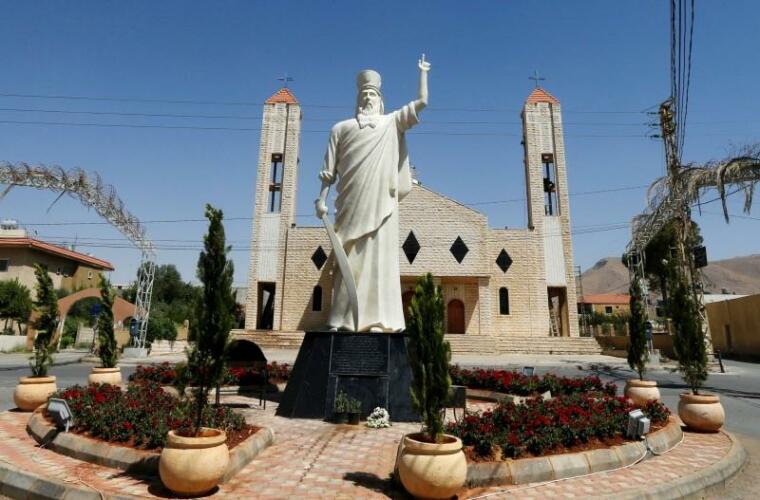Lebanon Christian town directs anger at Syrian refugees after suicide attacks
The predominantly Christian town of Al Qaa in Lebanon directed its fury toward the town's displaced Syrians after suicide bombers blasted themselves, leaving five people killed and dozens wounded, in a series of suicide attacks in late June.

Five died and 15 wounded when four suicide bombers blasted themselves on the early morning of June 27. Another attack followed by the evening and wounded 13 more as the victims' friends and families gathered outside the Saint Elias Church. No groups claimed responsibility for the attacks but the Lebanese Christians already turned wary eyes on the town's Syrian refugees.
"It is not easy for people, when their sons have died or are in critical condition, to differentiate between terrorists and refugees," said the Roman Catholic priest who oversees Al Qaa's churches, Rev. Elian Nasrallah, in an interview with The New York Times.
Governor Bashir Khedr imposed a curfew for the Syrian refugees in the area following the attacks while Foreign Minister Gebran Bassil previously called a ban on any gatherings among the Syrian refugee camps.
"No one can deny the reality that displacement will be used as a cover for terrorism," the Associated Press quoted Bassil as saying.
The day after the bombing attacks, Lebanese troops raided the Syrian refugee camps and the Qaa Projects camp and arrested 103 Syrians "for not having legal papers" and confiscated nine motorbikes.
The small country of 4.5 million in population is reeling from the effects of being the second largest host to refugees when it accepted 1.5 million Syrians.
"We welcomed them and helped them, thinking that it was a short-term crisis," town council member Elian Nader told The New York Times.
Even displaced Syrians who resettled in the town three years ago knew what the attacks meant for them.
"As soon as I heard that the explosions were here, I said, 'It's over,'" said Fariha Juma, a Syrian mother of four.
Their landlord, Tony Matar, has a son wounded from the bomb attack and still recovering in the hospital.
"There are those who benefited the village and those who hurt it," Matar said. "The problem now is that people talk as if all the Syrians are responsible."
 Christians don't have to affirm transgenderism, but they can’t express that view at work: tribunal
Christians don't have to affirm transgenderism, but they can’t express that view at work: tribunal Archaeology discovery: Medieval Christian prayer beads found on Holy Island
Archaeology discovery: Medieval Christian prayer beads found on Holy Island Presbyterian Church in America votes to leave National Association of Evangelicals
Presbyterian Church in America votes to leave National Association of Evangelicals Over 50 killed in 'vile and satanic' attack at Nigerian church on Pentecost Sunday
Over 50 killed in 'vile and satanic' attack at Nigerian church on Pentecost Sunday Ukrainian Orthodox Church severs ties with Moscow over Patriarch Kirill's support for Putin's war
Ukrainian Orthodox Church severs ties with Moscow over Patriarch Kirill's support for Putin's war Islamic State kills 20 Nigerian Christians as revenge for US airstrike
Islamic State kills 20 Nigerian Christians as revenge for US airstrike Man who served 33 years in prison for murder leads inmates to Christ
Man who served 33 years in prison for murder leads inmates to Christ


 Nigerian student beaten to death, body burned over ‘blasphemous’ WhatsApp message
Nigerian student beaten to death, body burned over ‘blasphemous’ WhatsApp message 'A new low': World reacts after Hong Kong arrests 90-year-old Cardinal Joseph Zen
'A new low': World reacts after Hong Kong arrests 90-year-old Cardinal Joseph Zen Iran sentences Christian man to 10 years in prison for hosting house church worship gathering
Iran sentences Christian man to 10 years in prison for hosting house church worship gathering French Guyana: Pastor shot dead, church set on fire after meeting delegation of Evangelicals
French Guyana: Pastor shot dead, church set on fire after meeting delegation of Evangelicals ‘Talking Jesus’ report finds only 6% of UK adults identify as practicing Christians
‘Talking Jesus’ report finds only 6% of UK adults identify as practicing Christians Mission Eurasia ministry center blown up in Ukraine, hundreds of Bibles destroyed: 'God will provide'
Mission Eurasia ministry center blown up in Ukraine, hundreds of Bibles destroyed: 'God will provide' Church holds service for first time after ISIS desecrated it 8 years ago
Church holds service for first time after ISIS desecrated it 8 years ago Burger King apologizes for 'offensive campaign' using Jesus' words at the Last Supper
Burger King apologizes for 'offensive campaign' using Jesus' words at the Last Supper Uganda: Muslims abduct teacher, burn him inside mosque for praying in Christ’s name
Uganda: Muslims abduct teacher, burn him inside mosque for praying in Christ’s name